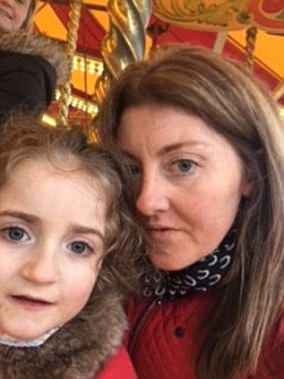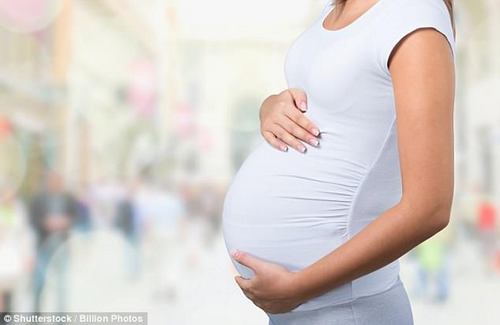This comes after two consultant neurologists said just last week that sodium valproate may be the only effective therapy for some expectant mothers, adding that untreated epilepsy poses a serious risk to both women and their unborn children.
A controversial epilepsy drug that has been prescribed to hundreds of thousands of women has been banned, health officials announced today. Sodium valproate, which raises the risk of serious developmental disorders in unborn children by up to 40 per cent, can no longer be taken by women of a childbearing age.
The Medicines and Healthcare Products Regulatory Agency (MHRA), which is behind the extreme move, put it in place to ‘protect public health’. Women of a childbearing age will only be able to take sodium valproate if they have a ‘pregnancy prevention programme’ (PPP) in place.
Sodium valproate previously came under fire when MailOnline reported three mothers blame the medication for leaving their children with autism, learning difficulties and incontinence after doctors failed to warn them of its risks during pregnancy.
Around 20,000 children in the UK have been affected by the drug, according to campaigners. Sanofi’s Epilim is typically a go-to brand in the UK and Ireland. NICE data reveals the drug raises the risk of malformations, such as cleft palates or lips, by 11 per cent, if it is taken during pregnancy.

A controversial epilepsy drug will be banned among women of a childbearing age unless they have a ‘pregnancy prevention programme’ in place, health officials announced today (stock)
NEUROLOGISTS SUPPORT VALPROATE’S USE IN PREGNANCY
Sodium valproate should not be banned during pregnancy, researchers argued in April 2018.
According to the consultant neurologists Heather Angus-Leppan and Rebecca Liu, from the Royal Free London NHS Foundation Trust, the controversial medication sodium valproate may be the only effective treatment for certain patients.
They add untreated epilepsy can seriously harm both pregnant women and their unborn children. Previous research suggests seizures increase in expectant mothers, particularly in their third trimesters.
Writing in the BMJ, Dr Angus-Leppan and Dr Liu said banning valproate ‘imposes less effective treatment for some female patients than for other people with a similar life-threatening or serious condition, without their consent.’
Earlier this year, the European Medicines Association recommended sodium valproate should only be prescribed to women of a childbearing age if they agree to use contraception, which Dr Angus-Leppan and Dr Liu wrote ‘could be considered an infringement of patient autonomy and liberty’.
They warn that women who are taking sodium valproate without medical supervision are at particular risk of giving birth to babies with birth defects, adding scaremongering ‘may result in women stopping their treatment without support’.
Dr Angus-Leppan and Dr Liu add further research is required to find a sodium valproate alternative.
Yet, in the meantime, women should be given specific information about the medication’s benefits and risks to help them make informed drug-taking decisions alongside their doctors.
What do the new rules mean?
The new measures require women of a childbearing age with epilepsy have their treatment reviewed by a specialist at least once a year.
Female patients will be required to sign a form acknowledging the risks of their treatment.
Meanwhile, the MHRA said that all women and girls who are prescribed sodium valproate should contact their GP to arrange a treatment review, while stressing that they should not stop taking the drug without medical advice.
The new measures also mean the medication’s packaging size will be reduced to encourage prescriptions on a month-by-month basis.
All valproate labeling will also have a picture warning against its use in pregnancy.
What might the pregnancy prevention programme involve?
Although unclear for sodium valproate, the PPP for the eczema drug Toctino prevents women from taking the medication while they are expecting.
Such women must immediately contact their doctor if they have unprotected sex or miss a period. At least two negative pregnancy tests four weeks apart are required before women are prescribed Toctino.
For women at risk of becoming pregnant, assessments are carried out every month.
Doctors are also required to confirm in writing that women understand the high risks of birth defects if they take Toctino during pregnancy.
‘Patient safety is our highest priority’
Valproate in pregnancy has come under intense scrutiny recently, with the European Medicines Agency holding a public hearing into medicines containing the drug. The medication also forms part of a government review into how the NHS responds to concerns over treatments.
Dr June Raine, director of the MHRA’s vigilance and risk management of medicines division ‘Patient safety is our highest priority.
‘We are committed to making sure women and girls are aware of the very real risks of taking valproate during pregnancy.
‘However, we also know it is vitally important women don’t stop taking valproate without first discussing it with their doctor.
‘I would like to particularly thank the families involved in the Valproate Stakeholder Network who have shared their experiences and expertise with us.
‘Their support will help keep future generations of children safe.’
Health Minister Lord O’Shaughnessy added: ‘Our priority is always patients’ safety, so I welcome this decision to take strong actions to protect women and children.
‘The focus will now be on explaining these changes to GPs and clinicians so they in turn can advise patients.’
Mother-of-two spent years blaming herself after both of her children battle severe learning difficulties, which she believes is due to the ‘poison’ drug

Samantha Luton-Hughes claims both of her children (pictured with daughter Phoebe, five) suffer severe learning difficulties due to her taking valproate
A mother-of-two has battled depression and spent years blaming herself as she believes both of her children suffer severe learning difficulties due to her taking sodium valproate during her pregnancies.
Samantha Luton-Hughes, 41, from Worcestershire, claims she was given no information from her doctor on the medication’s risk of serious disabilities during either of her pregnancies, resulting in her children Logan, six, and Phoebe, five, enduring ADHD, heart murmurs and hernias.
Unsure of her children’s future, Ms Luton-Hughes, a self-employed beauty therapist, is ‘fuming’ at the drug regulators who reportedly knew of sodium valproate’s risks for decades.
She said: ‘I have gone through hell. As a mother I blamed myself for taking the medication.’
Despite the havoc sodium valproate has wrecked on Ms Luton-Hughes’ life, she is still forced to take the medication to control her epilepsy.
She said: ‘Every single day I feel like I’m taking poison but if I know if I don’t take it I will have a seizure and I can’t run that risk.’

NICE data reveals sodium valproate raises the risk of babies suffering serious developmental disorders by up to 40 per cent and malformations, such as cleft palates, by 11 per cent (stock)
HOW MANY CHILDREN SUFFER?
Out of around 35,000 women aged 14-to-45 taking sodium valproate between 2010 and 2012, at least 1,125 were pregnant. If 450 babies are born every year to mothers taking the drug, up to 45 could have a physical disability and up to 180 may suffer from learning difficulties.
Between 1993 and 2008, there was a 20 per cent reduction in the number of women aged 15-to-55 who were taking sodium valproate due to new treatments being available.
The Medicines and Healthcare products Regulatory Agency says sodium valproate should not be given to women of a childbearing age or during pregnancy unless alternative treatments are ineffective or not tolerated.
Yet, in 2016, around 450 babies were born to mothers taking the drug during pregnancy.
Pregnant women will be more aware of the risks
Commenting on the news, Clare Pelham, chief executive of the Epilepsy Society charity, said: ‘The most important change today is that every woman and girl of childbearing age who has been prescribed sodium valproate will be able to see her doctor every year to discuss the risks of this drug to an unborn baby.
‘She will leave the discussion with an important written reminder of the risks if sodium valproate is taken during pregnancy.
‘This means that she will be able to make informed choices about whether to plan a pregnancy and her future medical treatment.
‘It has taken many years to achieve these simple, straightforward and inexpensive healthcare improvements that will prevent babies being born with avoidable disabilities.
She said: ‘All credit to the brave women who have campaigned for decades.
‘And to Jeremy Hunt for acting on that campaign and insisting the NHS must now learn from its failure to listen and act sooner in response to the concerns raised over many years and during many governments.’
The Royal College of Obstetricians and Gynaecologists recommends exposure to sodium valproate and other anti-epileptic drugs should be minimised by changing the medication prior to conception, as recommended by an epilepsy specialist after a careful evaluation of the potential risks and benefits.
TIMELINE OF EVENTS FIGHTING TO STOP THE PROBLEM
In 2014 The European Medicines Agency agreed to strengthen warnings and restrictions on sodium valproate’s use in women and girls.
The Medicines and Healthcare Regulatory Agency (MHRA) advised healthcare professionals not to prescribe the drug to females unless other treatments are ineffective or poorly tolerated.
On February 8 2016, the MHRA launched a toolkit to help healthcare professionals talk to women with epilepsy about sodium valproate’s risks during pregnancy.
Prominent written warnings were also added to the drug’s packaging in 2016.
On April 6 2017, NHS Improvement and the MHRA sent a Patient Safety Alert through the central NHS system to further highlight sodium valproate’s risks during pregnancy.
A public hearing was held in London on 26 September last year by the European Medicines Agency’s Pharmacovigilance Risk Assessment Committee where EU citizens spoke of their experiences of the medication.
Why is sodium valproate controversial?
In September last year, campaigners presented evidence to a hearing of the European Medicines Agency in London, revealing that drug regulators knew of the drug’s problems as far back as 1973 but did not add warnings to its packaging until 2015.
Last January it emerged a professor from the University of Liverpool is studying a boy affected by sodium valproate syndrome to determine if he developed the condition as a result of his grandmother taking the drug during pregnancy.
FACS Aware, which campaigns for sufferers of foetal anti-convulsant syndromes, is fighting for increased support for sufferers and better awareness among healthcare professionals.
Michael Szumera, head of communications at Sanofi, previously told MailOnline: ‘Valproate has at all times been supplied by Sanofi in the UK with a warning of the risk of malformations in babies born to mothers with epilepsy who take the product during pregnancy.
‘The product information for valproate (including the addition of warnings on the package labelling) has at all times been approved by the regulatory authorities as properly reflecting current scientific and medical knowledge before being put into circulation.
‘Sanofi has systematically reminded patients via the information document that they should consult their prescribing physician in case of pregnancy or desire for pregnancy so that their physician can act accordingly.’
WOMEN LEFT IN THE DARK OVER SODIUM VALPROATE’S RISKS
The risks of pregnant women taking sodium valproate were kept from patients for 40 years, a hearing was told.
In September last year, campaigners presented evidence to a hearing of the European Medicines Agency in London, revealing that regulators knew of the problems as far back as 1973.
Even the drug’s manufacturer Sanofi was open about the risks. Yet documents show UK officials decided at the time not to put the warnings on the packets for fear it ‘could give rise to fruitless anxiety’, the hearing was told.
It was not until 2015 that clear warnings were published. Catherine Cox, from the Foetal Anti-Convulsant Support Association for the UK, said: ‘These warnings could have and should have been given in 1974.
‘A decision was taken not to publish them despite warnings by the manufacturer.’
Health professionals were told at the time: ‘This compound has been shown to be teratogenic in animals, meaning it could harm the human foetus.;
Yet the Committee on Safety of Medicines, which existed before the MHRA, said the warning should ‘not go on the package inserts, so that there would be no danger of patients themselves seeing it,’ according to documents seen by Sky News.
Dr Eric Teo, who is in responsible for drug safety at Sanofi, told the hearing: ‘Sanofi had always provided the most up to date scientific information, with the approval of the health authorities.
‘There is a consent form for doctors to review with patients, there are patient cards to take home and there is also a prominent warning on the outside of the box.’
He also added that for some women valproate is the only option.
Dr Teo said: ‘Switching or discontinuing treatment before or during pregnancy carries the risk of recurrent seizures which could lead to brain damage or death.’




Unquestionably believe that which you said. Your favorite reason appeared to be on the web the easiest thing to be aware of. I say to you, I certainly get annoyed while people think about worries
that they plainly don’t know about. You managed to hit the nail upon the top and also defined out the whole thing without having side-effects , people can take a signal. Will likely be back to get more. Thanks